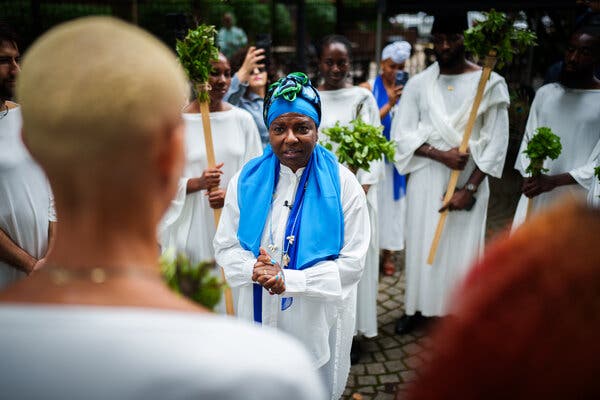
The Metropolitan Museum of Art is returning to Greece the bronze head of a griffin, the mythological creature, after determining that the artifact from the 7th century B.C. was likely stolen from an archaeological museum in Olympia in the 1930s.
The museum said the head, which entered the collection as a gift from a former trustee in 1972, will be turned over to Greece’s minister of culture at a ceremony Monday at the Met.
 Campos-Pons, in blue, speaks to the “angels” before the beginning of the march at Harlem Art Park on 120th Street.Credit...Graham Dickie/The New York TimesImage
Campos-Pons, in blue, speaks to the “angels” before the beginning of the march at Harlem Art Park on 120th Street.Credit...Graham Dickie/The New York TimesImage
In her welcoming remarks, Campos-Pons told the crowd that, rather than a protest, “this is a walk of love,66jogo Cassinos ao Vivo Brasil a walk for hope, a walk for the future, a walk for people who precede us and for people who are not yet here.” Billed as a “Procession of Angels for Radical Love and Unity,” the event spans two mornings in September. Last Saturday’s route started at the Harlem Art Park, a cobblestone site on East 120th Street in the heart of a neighborhood home to African Americans and people from Puerto Rican, Mexican, Caribbean, and African diasporas. The second procession is on Sept. 20 and will begin in Central Park and end in Madison Square Park, in the wealthy Flatiron district.
Though discussions about the provenance of the piece have been underway since 2018, the museum said the decision to return it was finalized only a few months ago. It will be the first piece from the Met’s collection to be repatriated since the museum installed a new executive, Lucian Simmons, last year to lead an expanded provenance research unit.
The museum chose to devote more research efforts to determining the provenance of its expansive holdings after a series of seizures of looted artifacts and increased scrutiny over the protocols it had used to accept and purchase works and objects, particularly antiquities.
As head of provenance research, a newly created role, Simmons, a former executive at Sotheby’s, oversees a team of analysts that has been expanded from six to 11.
The ancient Greeks often decorated their bronze cauldrons, used to honor the gods, with the head of a griffin, whose visage is that of an eagle but whose body is that of a lion. On its website, the Met said that the cauldrons set on tripods or conical stands were often used as votive gifts dedicated in Greek sanctuaries from the eighth to the sixth centuries B.C.
We are having trouble retrieving the article content.
Please enable JavaScript in your browser settings.
Thank you for your patience while we verify access. If you are in Reader mode please exit and log into your Times account, or subscribe for all of The Times.
Thank you for your patience while we verify access.
Already a subscriber? Log in.
boixxxWant all of The Times? Subscribe.umibet2
